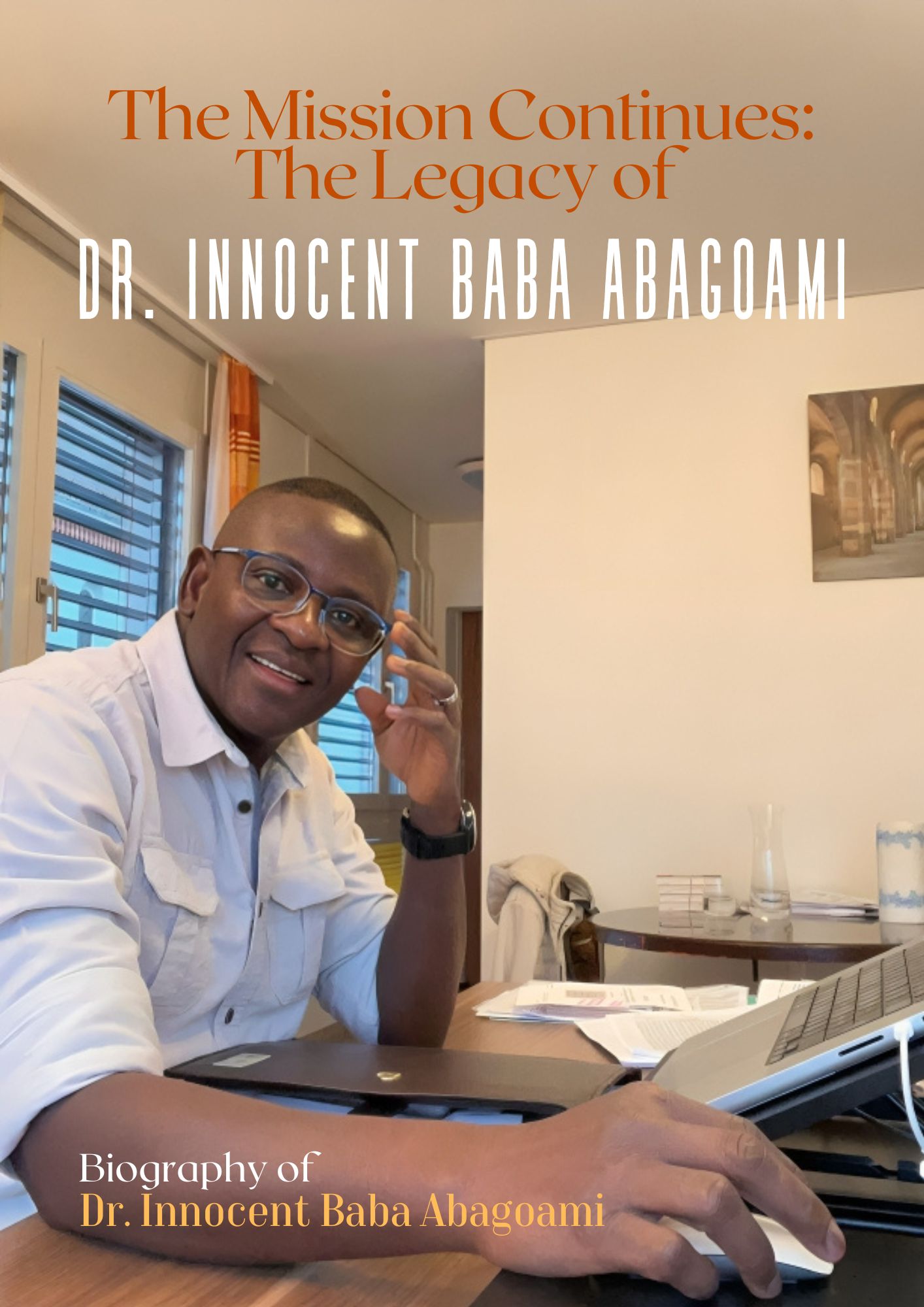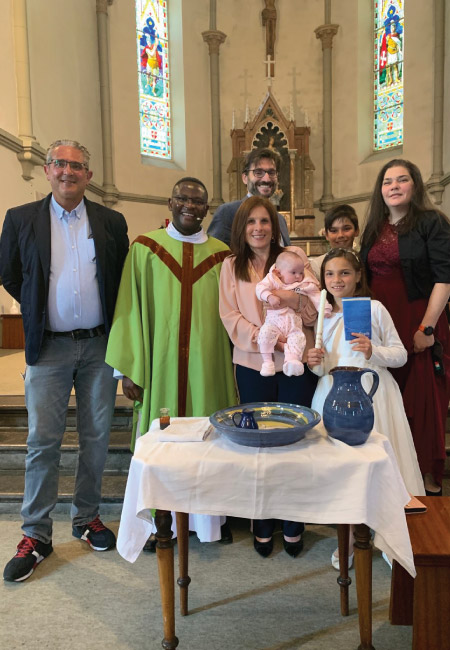

“The best way to find yourself is to lose yourself in the service of others.”
Introduction
The story you are about to read is not merely a timeline of events, but a living testament to faith, resilience, purpose, and unwavering service. It is the story of a man born in the heart of West Africa, whose soul was set on fire by the call of God, and who answered that call with humility, courage, and devotion.
Dr. Innocent Baba Abagoami, born on July 6, 1972, in Kumasi, Ghana, is not just a priest by title—he is a missionary in the truest sense, a bridge between cultures, and a tireless servant of the Gospel. From his earliest days, shaped by faith-filled parents and a thirst for learning, to his theological studies in Nigeria, pastoral missions in Algeria and Benin, and spiritual leadership in Switzerland, every step of his journey has been guided by divine purpose.
This biography opens a window into a life that crosses borders—geographically, spiritually, and intellectually. It reflects his tireless pursuit of peace in divided lands, his passion for human development, and his gift for ministering to both the heart and the mind. As a scholar, linguist, and author, his words bring nourishment; as a pastor and leader, his presence brings healing.
Through detailed chapters, personal reflections, and historical context, this book celebrates a man who embodies what it means to live for others. It invites you, the reader, to walk alongside Dr. Abagoami—not only to witness his life, but to be moved by it.
May his journey awaken something within you.
May it challenge you to reflect more deeply, serve more sincerely, and believe more boldly.
Welcome to the story of a life well-lived.
Welcome to the world of Dr. Innocent Baba Abagoami.
Phase 1 : Roots of Innocent (1972–1984)
“The roots of education are bitter, but the fruit is sweet.”

On a quiet July morning in 1972, in the culturally rich and spiritually vibrant city of Kumasi, nestled within Ghana’s Ashanti Region, a child was born whose name would one day echo across nations in both reverence and purpose. Dr. Innocent Baba Abagoami, son of Richard Ajuik Abagoami and Felicia Apagrah Abagoami, entered the world not only as a blessing to his family but as a soul marked for service. His birth was more than a mere moment—it was the quiet beginning of a destiny rooted in faith, sacrifice, and a lifelong mission to serve others.
His parents, devout and grounded, were pillars of moral strength and cultural pride. Richard and Felicia instilled in their children the virtues of humility, discipline, and reverence for God. These values would take deep root in Dr. Innocent’s life, shaping the spiritual compass that would guide his journey for decades to come. That same year, his parents brought him to St. Paul’s Catholic Parish in Walewale, Northern Ghana, where he was baptized into the Catholic faith—a sacred rite that would set him on a lifelong path of religious devotion and missionary zeal.
Dr. Innocent’s early years were far from static; his childhood unfolded across multiple towns and communities. This movement—though challenging at times—was not without meaning. It became part of a rich tapestry that allowed him to encounter different cultures, dialects, and traditions within Ghana. More than a geographical journey, it was a formative experience that instilled in him adaptability, empathy, and an openness to the diversity of human experience.
His educational journey began in 1977 at Gambaga Primary School, a modest institution that provided more than literacy—it became his first encounter with structure, discipline, and a thirst for learning. In 1980, the family relocated, and Dr. Innocent continued his studies at Damongo Jakpa Primary, where he not only deepened his academic foundation but also began to display quiet leadership, a gentle compassion for his peers, and a contemplative nature that often made him stand out among classmates. His elementary education culminated at Salaga Roman Catholic Primary School (1983–1984), a place where faith and academics were beautifully interwoven, reinforcing his devotion to both spiritual and intellectual growth.
Phase 2 : Foundations of Faith and Scholarship (1986– 1995)
“Faith is taking the first step even when you don’t see the whole staircase.”

The adolescent years of Dr. Innocent Baba Abagoami were not shaped by mere routine or ordinary ambition. Rather, they were sculpted by a silent, steady pull toward something sacred—something bigger than himself. It was during this phase, from 1986 to 1995, that the convergence of faith and scholarship began to take profound form, laying a foundation that would sustain and elevate his life’s mission for decades to come.
At the age of fourteen, Innocent entered the Notre Dame Minor Seminary in Navrongo, a town in Ghana’s Upper East Region, known for its vibrant Catholic heritage and academic rigor. From 1986 to 1991, within the walls of this seminary, he pursued his Ordinary Level Certificate (O-Level) studies. But this institution was more than an academic hall—it was a spiritual forge. Days began and ended with prayer. Silence, reflection, discipline, and simplicity were not just ideals, but a way of life. Here, in the rhythm of daily Mass, communal meals, theological readings, and structured learning, Innocent encountered both the rigor of intellectual formation and the depth of interior transformation.
Seminary life nurtured in him an unwavering sense of purpose. He was not just studying for exams—he was discerning a vocation. The questions posed by philosophy and theology were not abstract; they were personal, living inquiries. Who am I? What does it mean to serve? What does God ask of me? These reflections matured his soul, even as textbooks sharpened his mind. It was during these years that Dr. Innocent’s quiet demeanour and contemplative nature blossomed into a sense of sacred responsibility.
Having successfully completed his O-Levels, he moved to the Wenchi Secondary School in the Brong Ahafo Region from 1991 to 1993, where he pursued his Advanced Level Certificate (A-Level). Unlike the enclosed world of the seminary, Wenchi exposed him to a broader, more diverse academic environment. Here, his earlier spiritual training was tested and strengthened amid a more secular setting. He remained rooted in his values—choosing humility over pride, diligence over distraction, and service over self. His performance was strong, and his work ethic unmatched, as he balanced the demands of study with the quiet discipline of daily devotion. It was a bridge between faith and intellect, building not only knowledge but wisdom.
Phase 3 : Embracing the Spiritan Life (1995–2000)
“Vocation is the place where our deep gladness meets the world’s deep need.”

By 1995, Dr. Innocent Baba Abagoami stood at the crossroads of personal calling and divine purpose. The years of study, prayer, and service had prepared the soil of his soul. Now, he was ready to answer the call that had echoed softly within him since boyhood. That year, he entered the Spiritan Postulancy Seminary in Kumasi, Ghana—a profound turning point marking the beginning of his formal journey into religious life.
The Spiritan Postulancy is a unique phase—a sacred threshold between the world and the religious path. In this place, young men are introduced to the charism, history, and mission of the Congregation of the Holy Spirit (Spiritans), an international missionary order known for its service to the poor, the marginalized, and those on the peripheries of society. For Innocent, it was not merely an academic or ecclesiastical exercise. It was an immersion into a deeper rhythm of life—a life marked by community, humility, sacrifice, and joy.
Postulancy in Kumasi exposed him to the foundational tenets of the Spiritan identity: fidelity to the Gospel, love for the poor, openness to the Spirit, and communal living rooted in simplicity. In the silence of daily prayers, the rituals of shared meals, and the lessons in Church history and Spiritan spirituality, Innocent found something powerful—a home for his soul and a mission for his life.
In 1996, having completed his postulancy, Innocent proceeded to the Spiritan Novitiate in Ejisu, Ashanti Region—a year of deep spiritual formation and discernment. The novitiate is the crucible in which the Spiritan identity is fully forged. It is a time for withdrawing from the distractions of the outside world to focus on internal transformation, prayer, community, and learning the Spiritan Rule of Life. Here, Innocent began to embody the core Spiritan values: availability for mission, intercultural brotherhood, and complete trust in Divine Providence.
On the 8th of September, 1997, in a solemn and moving ceremony, Dr. Innocent made his First Religious Profession at the novitiate in Ejisu. Surrounded by fellow novices, superiors, and a community of faith, he vowed poverty, chastity, and obedience—not as restrictions, but as profound acts of love and freedom. It was a defining moment, a sacred “yes” to God and to a life of mission. From that day, Innocent no longer belonged to himself—he belonged to the Spirit, to the Church, and to all those he would serve.
With the ink of his profession barely dry, he began the next leg of his formation: Philosophical Studies at the Spiritan Institute of Philosophy in Ejisu, now known as Spiritan University College. From 1997 to 2000, Dr. Innocent delved into the intellectual heritage of the Church and the human search for meaning. Philosophy, for him, was not simply abstract theory—it was a tool for understanding the world, engaging with cultures, and wrestling with the deepest questions of God, humanity, suffering, justice, and love.